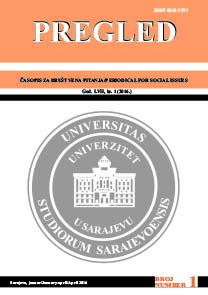Ustavna pitanja o poimanju suvereniteta u kontekstu procesa donošenja odluka u Bosni i Hercegovini
Constitutional Questions about Sovereignty in Context of the Legislative Process in Bosnia and Herzegovina
Author(s): Merima TanovićSubject(s): Constitutional Law, Governance, Government/Political systems, Politics and law
Published by: Univerzitet u Sarajevu
Keywords: internal sovereignty; external sovereignty; ultimate power; supreme authority; holder of sovereignty; quantification of the sovereignty and „quality“; power of the state;
Summary/Abstract: The issue of sovereignty always actualizes the commitment and pointing to the actual holders of real power and authority in Bosnia and Herzegovina, which takes controversial views and interpretations of the constitutional reality and political situation in our country. Sovereignty as a theoretical concept, is defined as the exclusive quality of a holder in the typical modern state, the category different to Bosnia and Herzegovina, according it‟s state organization, political system, and functioning of the state institutions. Pathological functioning of anatomically unique state organization, is leading to persistent tendencies of changes in legal supremacy as a main determinant of internal sovereignty in favor of the final interpreter of the General Framework Agreement for Peace in Bosnia and Herzegovina, and the owner of so called Bonn powers, adopted in 1997. The basis of the forthcoming analysis, which entails a number of issues, is a comparison of decision-making process in Parliamentary Assembly of Bosnia and Herzegovina, and the action of the High Representative for Bosnia and Herzegovina since 1997. until today, especially taking into account that the legal supremacy should be exclusive right of one subject to create and implement its own legal norms. The General Framework Agreement for Peace in Bosnia and Herzegovina in Annexes 4 and 10, supplemented by the so called Bonn powers in 1997, accords two possible entities for creating law in Bosnia and Herzegovina, and introduces complex legal discussion in context of indivisibility of sovereign , as a mostly unknown fact in theory of constitutional law. It‟s undoubtedly shown that the Institution of the High Representative in period 1997 until 2007, along with the decisions of the constitutional interpreter, the institution of the Constitutional Court of Bosnia and Herzegovina, is the main factor of creating law and legislative contribution of factual changing the Constitution, as well as factor of improving determined competencies of Bosnia and Herzegovina. The empirical analysis in this paper also indicates a change in focus and direction in the creation of law in Bosnia and Herzegovina, when institution of the High Representative since 2008 until 2011 partially, and since 2011, completely, is entering a phase and the role of pure supervision of the implementation of the General Framework Agreement for Peace in Bosnia and Herzegovina.
Journal: PREGLED - časopis za društvena pitanja
- Issue Year: LVII/2016
- Issue No: 1
- Page Range: 213-221
- Page Count: 9
- Language: Bosnian

